

The Framework Of Skills For Inquiry Learning (FOSIL) Can Transform Students’ Knowledge Of Their Subject. “Inquiry – a process and stance aimed at building knowledge and understanding of the world and ourselves in it, which is the basis for responsible participation in community – is fundamental to learning, both formal and informal” (Stripling and Toerien).
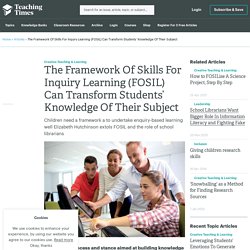
If this is a definition of inquiry, what does that mean in the reality of a school setting? In Linking librarians, inquiry learning, and information literacy (2020), Lance and Maniotes explain that the underlying principle of inquiry is that “Students choose a topic of interest to them, study it at depth, and share what they’ve learned. While teachers offer guidance and support, students ‘form their own questions through experiences, reflection, conversation, and writing [and] gain a sense of ownership and accomplishment in the work they are producing that gradually leads to competence, independence, and expertise'”.
Lib-Innovation: Exploring the impact of an embedded approach to Information Skills teaching. Information skills teaching is a core element of the service that the Library offers to students and, occasionally, staff at the university.
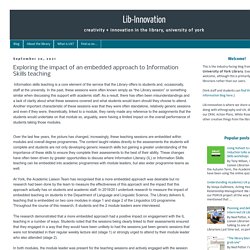
In the past, these sessions were often known simply as “the Library session” or something similar when discussing this support with academic staff. As a result, there has often been misunderstandings and a lack of clarity about what these sessions covered and what students would learn should they choose to attend. Another important characteristic of these sessions was that they were often standalone, relatively generic sessions and even if they were, theoretically, linked to a module, they rarely made any reference to the assignments that the students would undertake on that module so, arguably, were having a limited impact on the overall performance of students taking those modules. Over the last few years, the picture has changed, increasingly, these teaching sessions are embedded within modules and overall degree programmes. 8 Easy Ways to Stay Anonymous Online. Some might say the internet was built on anonymity, paving the way for a place where free speech reigns supreme.
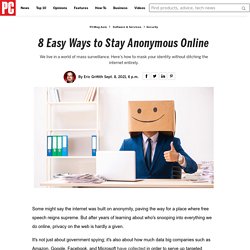
But after years of learning about who's snooping into everything we do online, privacy on the web is hardly a given. It's not just about government spying; it's also about how much data big companies such as Amazon, Google, Facebook, and Microsoft have collected in order to serve up targeted ads—not to mention how much of your personal data gets scooped up in all the breaches and hacks.
There are always going to be good reasons for people to go online without being tracked. For one, anonymity may be the only way for a real whistleblower to reveal corruption, considering how some have been treated. Journal of Information Literacy. View of Enhancing students’ professional information literacy. Information Literacy Is A Process, Not A Skill To Achieve. Information Literacy plays a huge part in our everyday lives; with the amount of data bombarding us in every day, hour or even minute, it’s crucial for one to be able to navigate between the different, more or less reliable sources.
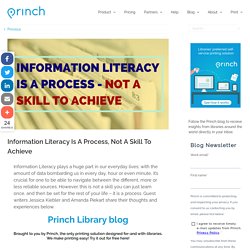
However, this is not a skill you can just learn once, and then be set for the rest of your life – it is a process. Digital Literacy and the Teacher Librarian - Part One. For this 2-part guest blog, we are delighted to welcome Trisha Templeton, Teacher Librarian at Daramalan College, ACT.
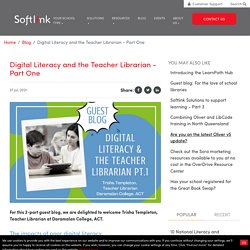
The impacts of poor digital literacy. The world’s economy has evolved with the transfer from production lines to one structured upon the creation and dissemination of information. This era has been revolutionised by the ubiquitous presence of the internet and the speed in which it is generated. Combined with rapidly evolving technology; access, use and production of information is easier. How to spot fake news - Netsafe – Providing free online safety advice in New Zealand.
Spotting misinformation is not easy and these days it’s spreading more than ever – a third of people have accidentally shared it online and 50% are concerned about mistakenly spreading it.
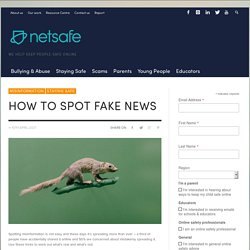
Use these tricks to work out what’s real and what’s not. Teaching Students to Legally Use Images Online. Education Programs. Terms and Conditions Apply. How to Teach Students Historical Inquiry Through Media Literacy And Critical Thinking. “I think that the lessons of history are exactly the kind of thing we should be talking about in history class,” Wineburg said.
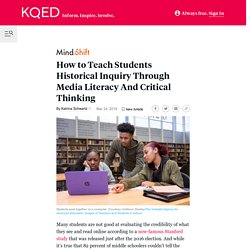
“But rather than teaching them as rules or things fixed in time or set in amber, these are precisely the kinds of things that are worthy of debate.” Today, most people look up information they don’t know on the internet, including students. So it’s even more important that students have tools they can use to make educated decisions about what they trust online. Will Colglazier, a U.S. history teacher in the San Mateo Union High School District, is taking this call to action to heart at Aragon High School. Apo nid312113. Note-Taking Strategies. FINAL Australian adult media literacy report 20212. Spotting Misinformation + Disinformation. Project Information Literacy. Media Literacy. Project Leads Dr.
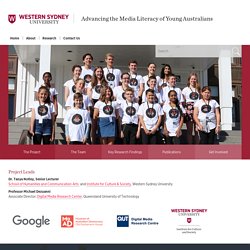
Tanya Notley, Senior LecturerSchool of Humanities and Communication Arts and Institute for Culture & Society, Western Sydney University Professor Michael DezuanniAssociate Director, Digital Media Research Center, Queensland University of Technology Project Leads Dr. Professor Michael DezuanniAssociate Director, Digital Media Research Center, Queensland University of Technology. News Literacy Week, Because One of the Things 2020 Taught is That Teens Need Better Information Literacy Skills - Teen Librarian Toolbox. Yesterday The Hollywood Reporter tweeted out an article with the headline “Get the Poodle Instead of the Prozac”, which got the pushback that an article like this deserves.
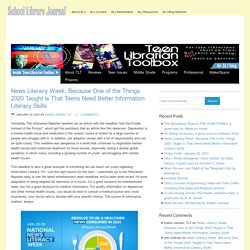
Depression is a mental health issue and medication it the correct course of action for a large number of people who struggle with it. In addition, pet adoption comes with a lot of responsibility and can be quite costly. This headline was dangerous in a world that continues to stigmatize mental health issues and medicinal treatment for those issues, especially during a deadly global pandemic in which many, including a growing number of youth, are struggling with mental health issues. There's no such thing as 'alternative facts'. 5 ways to spot misinformation and stop sharing it online.
The blame for the recent assault on the US Capitol and President Donald Trump’s broader dismantling of democratic institutions and norms can be laid at least partly on misinformation and conspiracy theories.
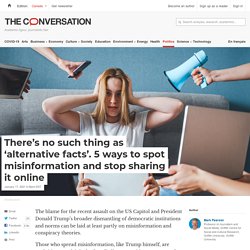
Those who spread misinformation, like Trump himself, are exploiting people’s lack of media literacy — it’s easy to spread lies to people who are prone to believe what they read online without questioning it. We are living in a dangerous age where the internet makes it possible to spread misinformation far and wide and most people lack the basic fact-checking abilities to discern fact from fiction — or, worse, the desire to develop a healthy skepticism at all. Read more: Stopping the spread of COVID-19 misinformation is the best 2021 New Year’s resolution Journalists are trained in this sort of thing — that is, the responsible ones who are trying to counter misinformation with truth. National News Literacy Week. Tackling misinformation: What researchers could do with social media data.
Written by Irene V. Pasquetto, Briony Swire-Thompson, Michelle A. Amazeen, Fabrício Benevenuto, Nadia M. Brashier, Robert M. Bond, Lia C. Educating for Misunderstanding. Spotting Misinformation and #FakeNews: 10 Resources To Teach Students Media Literacy. Examining persuasive techniques using visual and digital texts. This television advertisement (30 secs) for the popular Australian fruit contrasts the 'no nos' of sugary junk food with the long-lasting energy of bananas, affectionately referred to as 'na nas'. The ad employs a number of sophisticated visual techniques. Beginning with a scene showing a woman holding a sugary snack in one hand and a banana in the other, the 'given' and 'new' (Kress and Van Leeuwen, 1996) layout is evident.
The no no is positioned on the left, in the 'given', and the na na on the right, in the 'new'. Subsequent scenes then follow a repeating pattern of showing no nos and their negative effect on the consumer, followed by a corresponding na na scene with their positive effects. The no no eaters are shown as unhappy, unhealthy and sedentary people. The angles used throughout the ad further contribute to the intended message.
Students can be supported to critically consider the elements employed by the 'Lasting Energy' advertisement through questions such as: Media Literacy Week - MEDIA LITERACY - Education. Apo.org. Description In the wake of threats by Google and Facebook to scale back or close services in Australia should the federal government proceed with plans to charge them for news content, this report identifies serious risks to Australian businesses, government services and consumers if services were withdrawn. Key findings: Risks to the civil discourse if Facebook bans local news with the platform likely to be swamped with disinformation. Significant risks to local businesses if Google removes access to its advertising platform and to You Tube.
Disruption to health and education services which have become increasingly reliant on the Google suite of technology products. Suggested recommendations: Fast-track other elements of the ACCC Platforms Inquiry around consumer protection and privacy to address the existing advertising market dominance of the major platforms. Apo.org. We must make moral choices about how we relate to social media apps. Recently a South African radio show asked, “If you had to choose between your mobile phone and your pet, which would choose?”
Think about that for a moment. Many callers responded they would choose their phone. How Finland starts its fight against fake news in primary schools. You can start when children are very young, said Kari Kivinen. In fact, you should: “Fairytales work well. Take the wily fox who always cheats the other animals with his sly words. That’s not a bad metaphor for a certain kind of politician, is it?” With democracies around the world threatened by the seemingly unstoppable onslaught of false information, Finland – recently rated Europe’s most resistant nation to fake news – takes the fight seriously enough to teach it in primary school. In secondary schools, such as the state-run college in Helsinki where Kivinen is head teacher, multi-platform information literacy and strong critical thinking have become a core, cross-subject component of a national curriculum that was introduced in 2016.
Case studies. Infographic: News and young Australians. Ifla journal 46 2 2020. The effect of a teaching intervention on students’ online research skills in lower secondary education. SCU RAISE.
Media literacy concerns for Australian students amid rise in news consumption. Related Article They found family was the most common news source for 54 per cent of students. Supporting students through the Research Process – Linking Learning. Returning to a K-12 school environment after several years’ teaching at a Masters’ level at University has given me interesting insights into the way younger students engage with the research process.
View of The amazing library race. #FactVSFiction Articles for SLJ (and others) Search Education – Google. Power Searching with Google - Course. Lateral Reading with News Stories. Photographer Takes Pics Of People In Public From 2 Perspectives And It Shows How Easily The Media Can Manipulate Reality. Everyone knows that reality is subjective. 3 ways to help children think critically about the news. Like adults, children use the news to learn about what’s happening in the world. But the circulation of misinformation, such as the recent spread of fake news about COVID-19 (the disease caused by coronavirus), blurs our understanding of events and issues. In 2017, we conducted the first nationally representative survey of how Australian children, aged eight to 16, consume news.
17 Great Search Engines You Can Use Instead of Google. Google has transcended from being just another search engine. It has become ubiquitous, often used as a transitional verb. If you have any doubts, just Google it! Daniel Willingham on how students can be taught to spot fake news. Jimmy Wales: The birth of Wikipedia. Wikipedia:Wikipedia is not a reliable source. Wikipedia is not a reliable source. Wikipedia can be edited by anyone at any time. This means that any information it contains at any particular time could be vandalism, a work in progress, or just plain wrong. Biographies of living persons, subjects that happen to be in the news, and politically or culturally contentious topics are especially vulnerable to these issues.
News and media teaching ideas for secondary teachers, students and families. Encouraging the ‘why’ behind information literacy skills: a student perspective – Information Literacy Spaces. I recently read this article by Barbara Fister, and it was as if something jumped off the page at me. PISA’s warning: teachers need to teach Information Literacy explicitly if we are to reverse the decline – Information Literacy Spaces.
Six Fake News Techniques and Simple Tools to Vet Them. Old writer on the block: Do libraries need non-fiction books? Don't 'just Google it': 3 ways students can get the most from searching online. How Google Search Works (in 5 minutes) Fake News 2019 - ABC Education. Deepfakes: danger in the digital age. Innocence Project - Help us put an end to wrongful convictions! How Misinformation Spreads. Creating videos for our library YouTube channel - Ian Clark - Medium. Teaching students to be critical online learners. Information Literacy Weblog.
How fake news gets into our minds, and what you can do to resist it. Lateral Reading: A How-To. How fake news can exploit pictures to make people believe lies. 13 Pictures Show How Media Can Manipulate The Truth. Five ways you're being fooled by fake stories online - Science News - ABC News. Predatory publishers: the journals that churn out fake science. QUIZ: Is it Plagiarism? Ed.ted. Boolify: Boolean Search Teaching Tool. Human brains love fake news. An MIT study just figured out why. Lesson Plans – Search Education – Google. Reliable Sources: Promoting Critical Thinking in the [Mis]information Age.
Web Literacy for Student Fact-Checkers. Teaching Your Students About Fake News - Listenwise Teacher Support Center. Keepin It Real: Tips and Strategies for Evaluating Fake News. Top 10 sites to help students check their facts. Fact vs Fake: Resources to Help Librarians Navigate Digital Literacy. Fake news: improved critical literacy skills are key to telling fact from fiction. Turning Your Students Into Web Detectives.
Nik's QuickShout: Make PDF Texts into Interactive Online Activities for Blended Learning. Every Advanced Google Search Operator & Command You Need to Know. The definitive fact-checking site and reference source for urban legends, folklore, myths, rumors, and misinformation. Fact-checking U.S. politics. Practice: Evaluating Purpose - EasyBib Blog. The Questioning Toolkit - Revised. Five Key Questions Form Foundation for Media Inquiry. Web Literacy for Student Fact-Checkers. Identifying Fake News: An Infographic and Educator Resources - EasyBib Blog. How Savvy are Your Students?: 7 Fake Websites to Really Test Their Evaluation Skills - EasyBib Blog.
IFLA - Fake news? Not on our watch! The truth is out there... Evaluating Websites as Information Sources. 10 Ways to Spot a Fake News Article - EasyBib Blog. Alternative Facts and Fake News – Verifiability in the Information Society « Library Policy and Advocacy Blog. New Media Literacy: What Students Need to Know About Fake News. 8 Ways to Hone Your Fact-Checking Skills - InformED. Studyvibe - Home. Web Literacy Education for Educators - November Learning. 20 Things Educators Need To Know About Digital Literacy Skills.